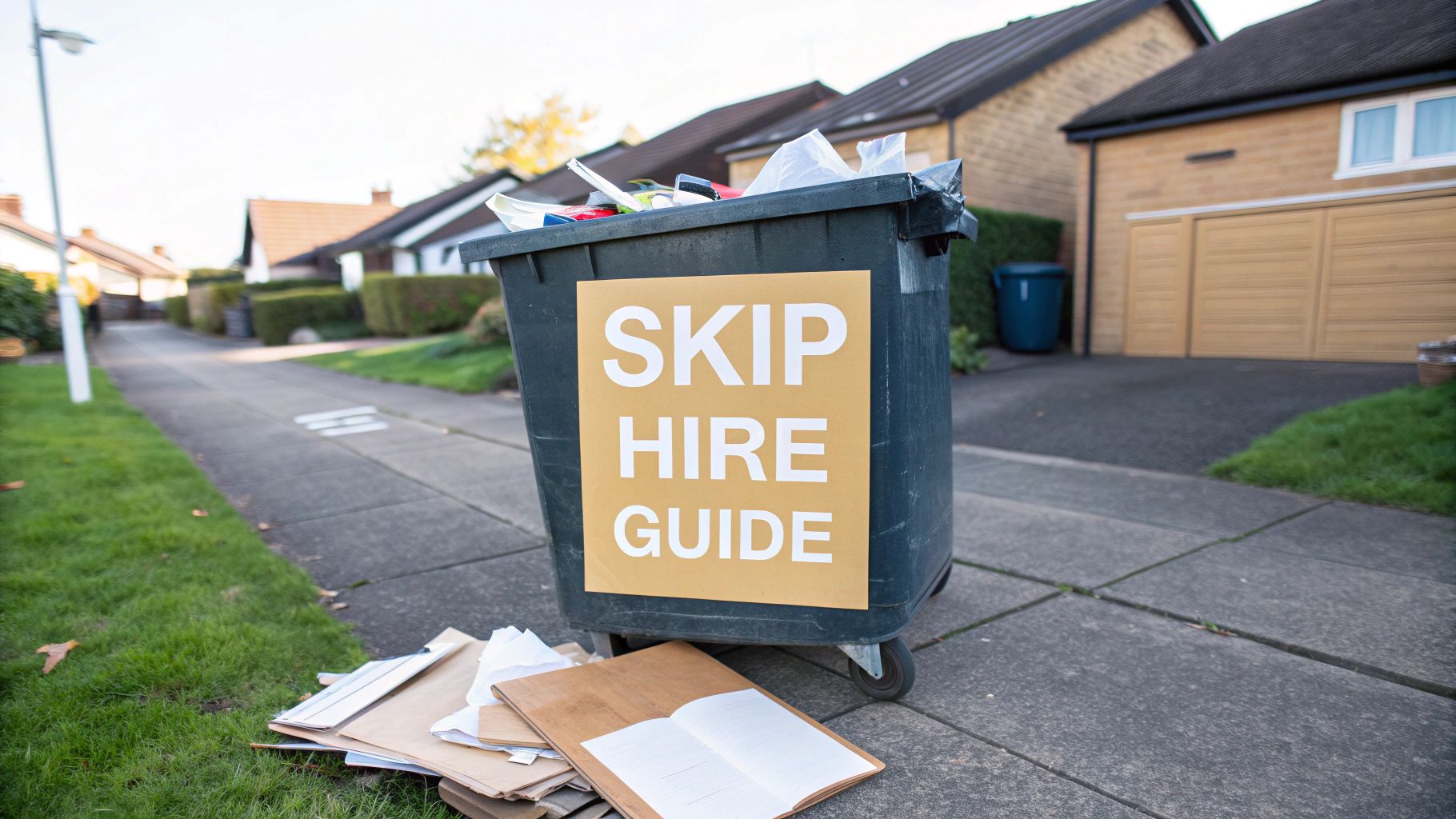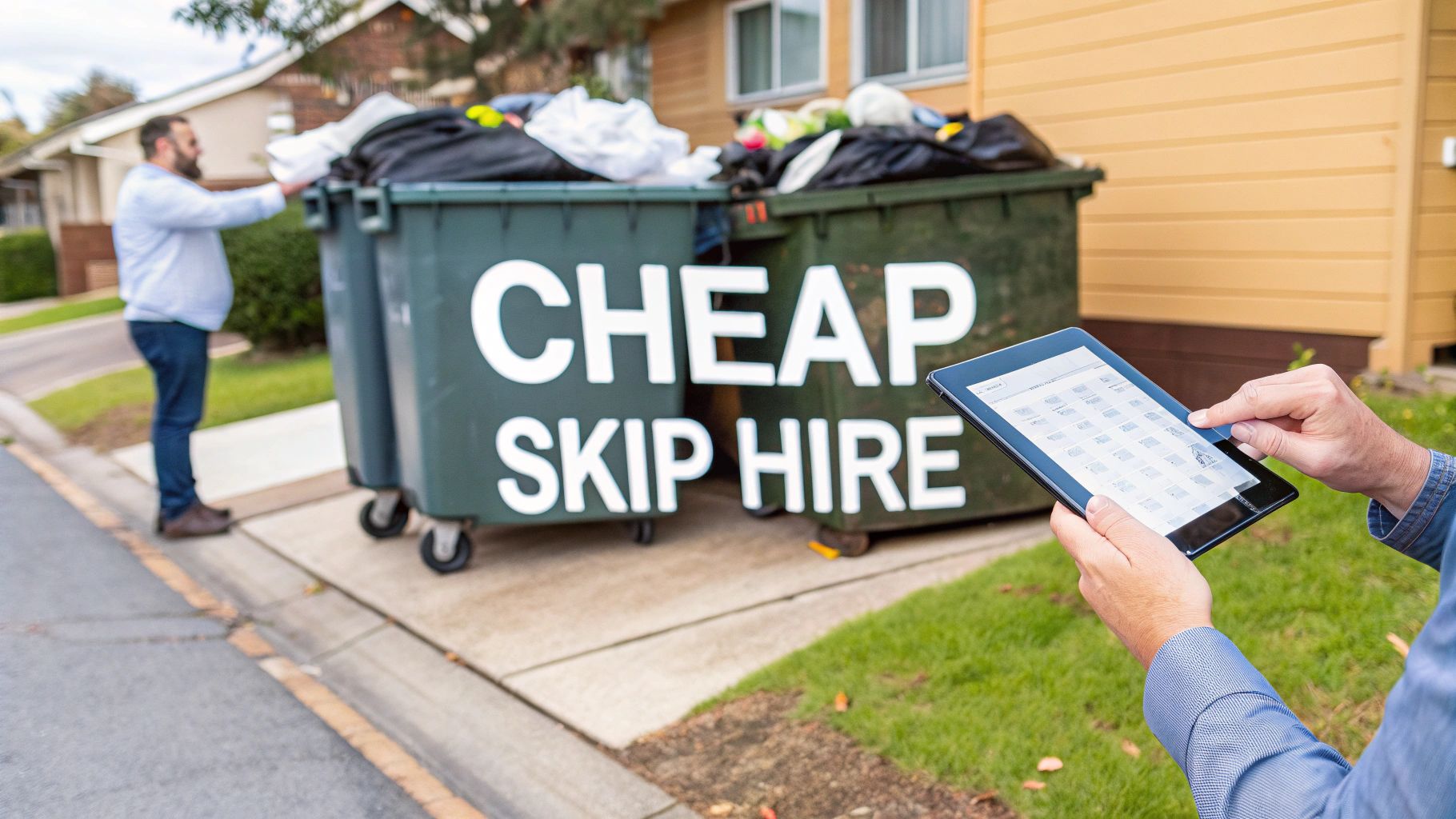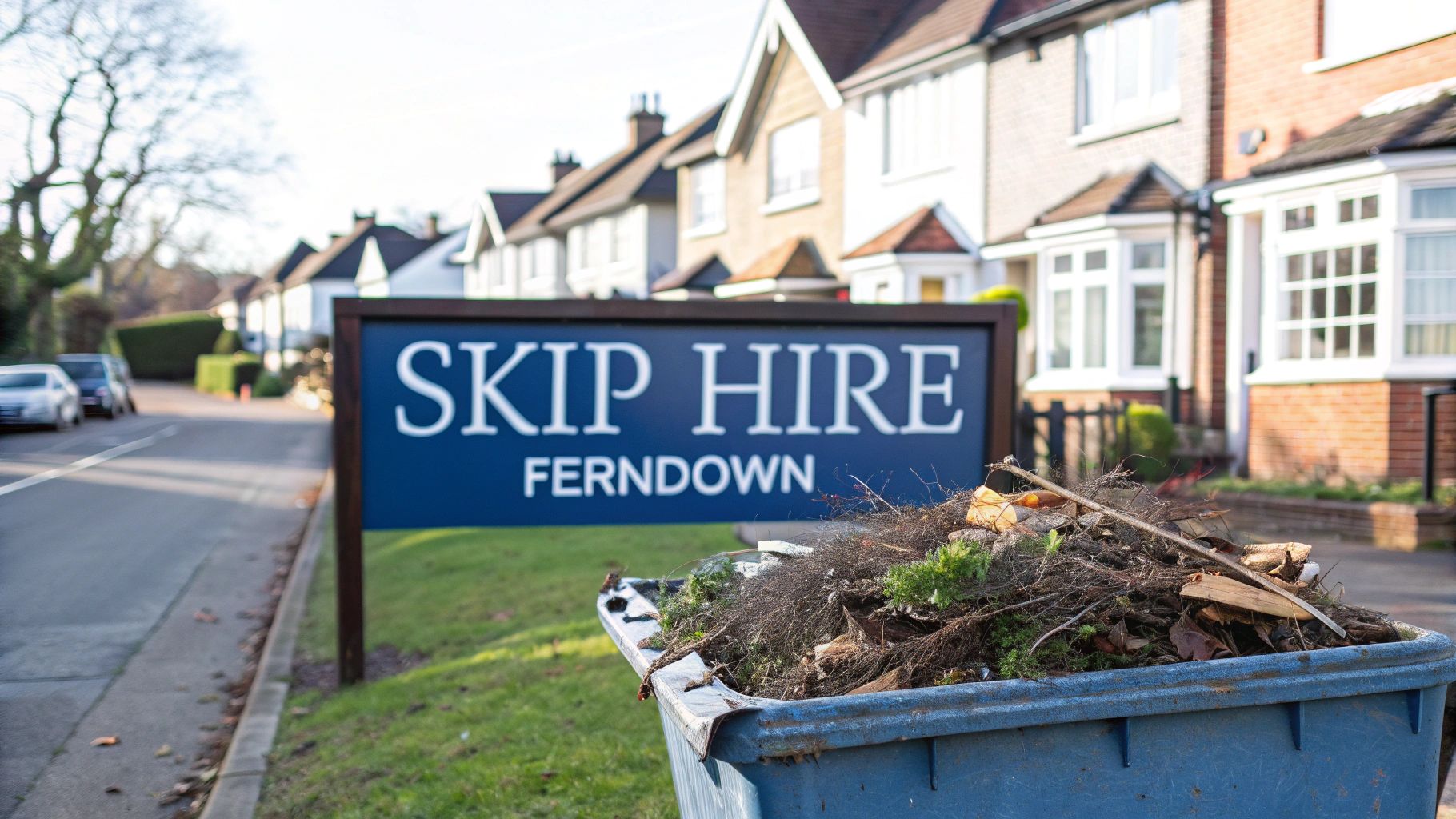Cost of Skip Hire Near Me | Your 2025 Guide to Affordable Prices
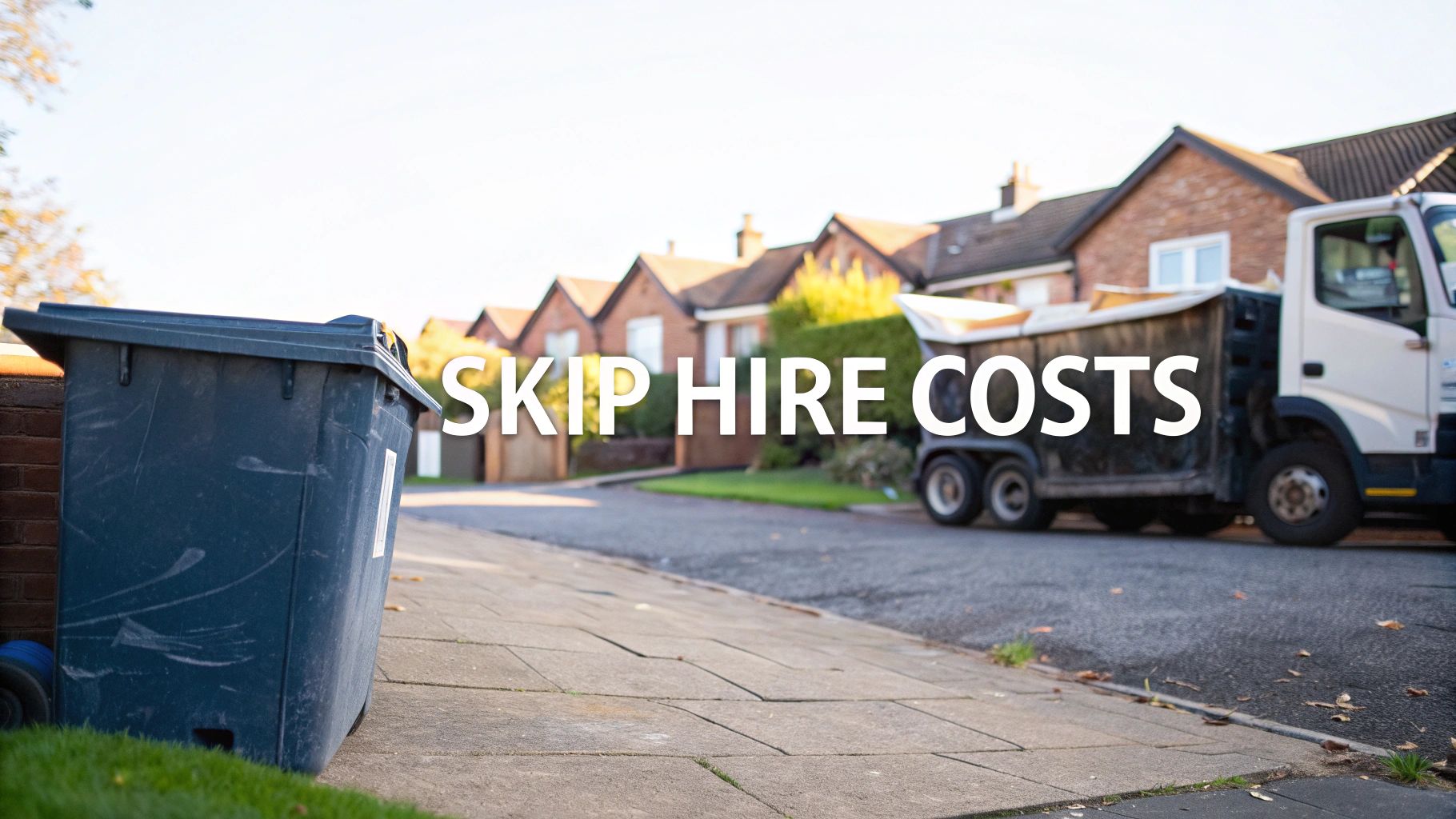
Cost of Skip Hire Near Me | Your 2024 Guide to Affordable Prices
If you’ve been searching for the “cost of skip hire near me,” you’ve probably seen prices ranging from around £120 for a small 4-yard skip right up to £300 or more for a larger 8-yard builder’s skip. These numbers are a great starting point for your budget, but they do change depending on where you are in the country and what you’re throwing away.
What Is the Average Cost of Skip Hire Near Me
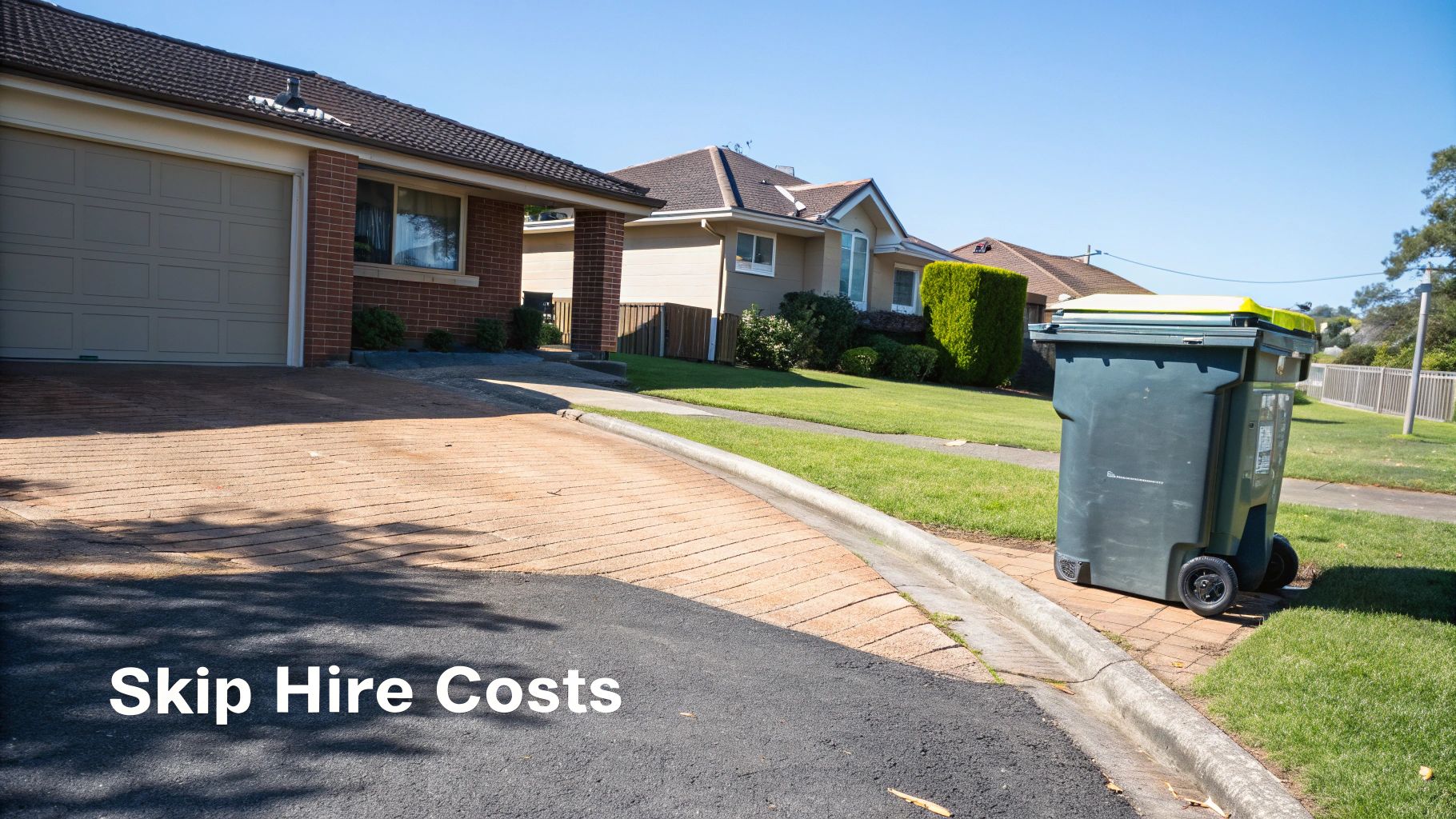
Trying to pin down the exact price of a skip is a bit like ordering at a restaurant—the final bill always depends on what you choose. The skip’s size is the main event, setting the base price, but other things like how long you need it, the type of waste, and even your postcode all add to the final cost.
Think of this as a quick reference guide to get you started. It gives you a practical estimate before we dive into all the little details that make up your final quote.
UK Skip Hire Price Guide by Size
To give you a clearer picture, here’s a breakdown of the most common skip sizes and what you can typically expect to pay for them across the UK.
Keep in mind these are just averages. Local demand and what it costs the skip company to dispose of waste in your area can cause these prices to fluctuate. For a closer look at how costs differ from one town to the next, check out our complete guide to local skip hire prices near me.
| Skip Size (Cubic Yards) | Typical Dimensions (L x W x H) | Approx. Capacity (Bin Bags) | Average Price Range (VAT excl.) |
|---|---|---|---|
| 4 Yard ‘Mini’ Skip | 1.8m x 1.3m x 0.9m | 30-40 | £120 – £160 |
| 6 Yard ‘Small Builder’s’ Skip | 2.6m x 1.5m x 1.2m | 50-60 | £200 – £250 |
| 8 Yard ‘Large Builder’s’ Skip | 3.6m x 1.7m x 1.2m | 70-80 | £240 – £310 |
| 12 Yard ‘Maxi’ Skip | 3.7m x 1.8m x 1.7m | 100-120 | £350 – £450 |
The table gives you a solid idea of costs based on size, but what you put in the skip is just as important.
The type of waste you’re getting rid of can really shift the final price. For example, heavy, inert waste from jobs like stone wall repointing projects has different disposal costs compared to general household junk. It’s always best to double-check what materials are allowed before you book.
Decoding Your Skip Hire Quote
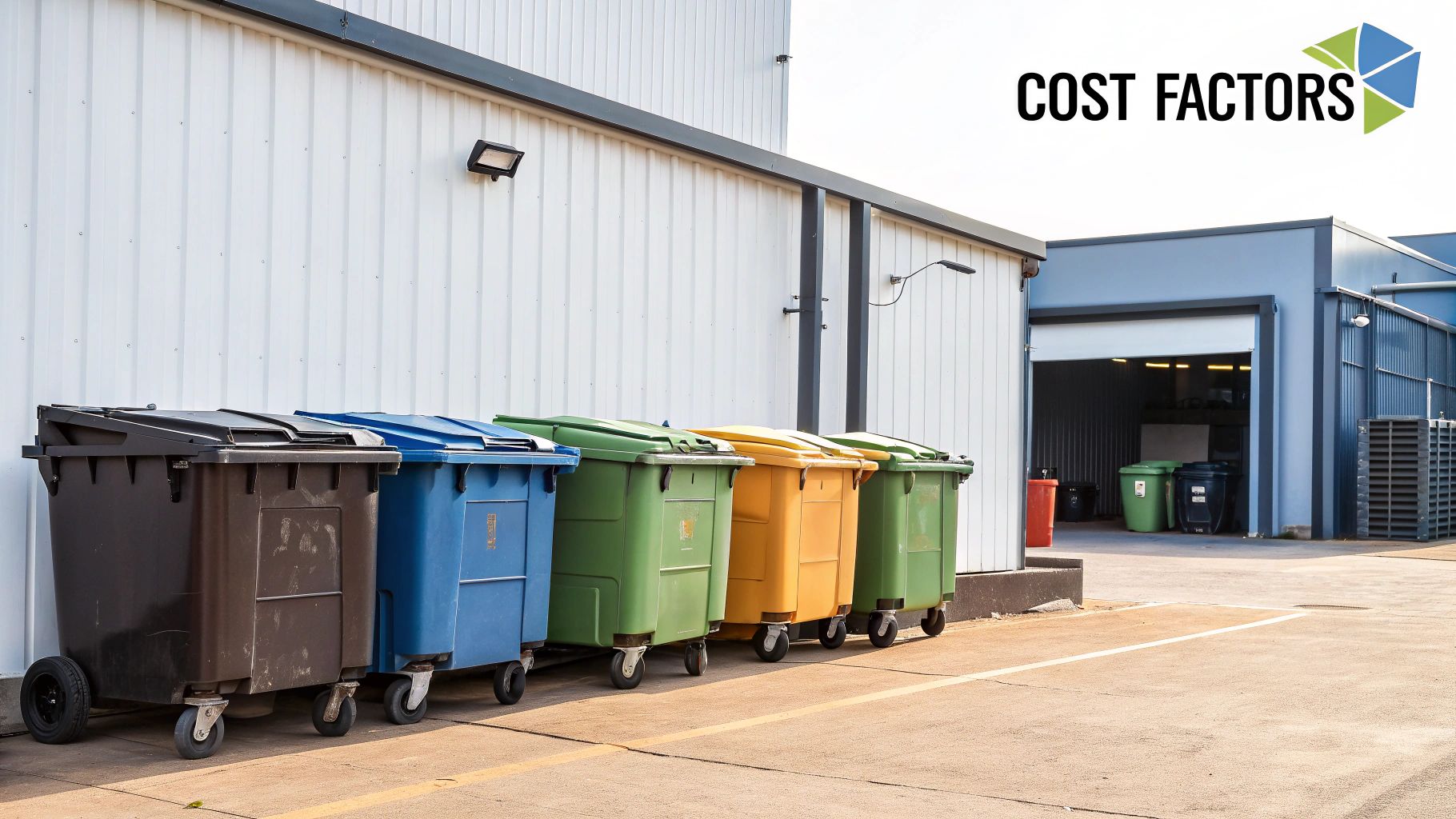
Have you ever searched for “cost of skip hire near me” and been left scratching your head when two quotes for the exact same size skip come back worlds apart? It’s a common situation, and it leaves many wondering what actually goes into that final price. The truth is, it’s not just one thing but a combination of key factors that every skip hire company has to account for.
Getting to grips with these components helps you see the real value behind the price tag. Think of it like deconstructing a recipe; once you know the ingredients, the final dish makes a lot more sense. For skip hire, the main ingredients are the skip’s size, how long you need it, what you’re throwing away, and your location.
Each of these plays a massive part in what you’ll pay. Getting just one of them wrong can lead to surprise costs, quickly turning a budget-friendly project into an expensive headache. Let’s break down exactly what you’re paying for.
The Role of Skip Size and Hire Duration
The most straightforward factor in your quote is the skip size. It’s just like booking a moving van – a bigger van costs more because it can hold more, and the same logic applies here. It might be tempting to opt for the smallest size to keep costs down, but underestimating your waste can backfire, big time.
If you fill your skip before the job is done, you’ll be forced to pay for a second one, completely wiping out any money you thought you’d saved. In almost every case, it’s more cost-effective to go one size up if you’re not completely sure.
Next up is the hire duration. A standard hire period is usually for one to two weeks, and this is typically built into the initial price. But if your project is going to drag on a bit longer, you’ll need to arrange for an extended hire. Just like staying extra nights in a hotel, this will add to your final bill. Always double-check the standard hire period and what the daily or weekly charges are for any extra time.
How Waste Type Affects Your Price
What you’re putting in the skip is just as crucial as its size. Different materials have completely different disposal costs, and this is a big part of your quote. You can think of it like sending a parcel; a small, light letter costs pennies to post compared to a heavy, fragile package that needs special handling.
Waste is generally broken down into a few main categories to work out the cost:
- General Mixed Waste: This is your typical mix of household junk, light building debris, and garden waste. It’s the most common category and is usually covered by the standard hire price.
- Inert Waste: This covers all the heavy stuff, like soil, rubble, bricks, and concrete. Because these materials are easily recycled into aggregates for construction, they are often cheaper to dispose of.
- Hazardous Waste: Items like asbestos, plasterboard, batteries, electricals (WEEE), and tyres are a strict no-go for standard skips. They need specialised disposal, which costs a lot more and has to be arranged separately.
One of the most common pitfalls is mixing waste types that shouldn’t be mixed. Plasterboard, for instance, has to be kept separate from other waste due to environmental rules. If it gets mixed in, you could be hit with some hefty penalty charges from the skip company.
The Impact of Location and Permits
Finally, your postcode has a huge say in the price. The cost of skip hire near me will change quite a bit depending on where you are in the country. This is all down to local running costs like fuel prices and regional landfill taxes, which vary from place to place. For example, prices in central London are almost always going to be higher than in more rural spots. You can see a full breakdown of these regional differences in our guide to local skip hire prices.
On top of that, if you don’t have a private driveway or garden to place the skip, it will have to go on a public road. This means you’ll need a skip permit from your local council. The cost and application process for these vary wildly between councils but can add anywhere from £30 to over £100 to your total. Your skip hire company will nearly always sort this out for you, but they’ll pass the cost on in your quote.
How the Broader Economy Shapes Skip Prices
When you search for “cost of skip hire near me,” the prices you see are influenced by more than just the size of your project. Behind the scenes, a whole host of wider economic factors creates ripples that directly affect your final quote. Think of it like the price of your morning coffee; it’s not just about the beans and milk, but the café’s rent, transport costs, and staff wages too.
In the same way, the skip hire industry is constantly juggling its own operational costs. These are the unavoidable expenses every company has to deal with, and when they go up, those increases often have to be passed on to the customer. Knowing about these pressures helps make sense of why prices can change, even when the service you’re getting is exactly the same.
The Impact of Operational Costs
Two of the biggest operational headaches are fuel and steel. Every single skip delivery and collection runs on a lorry, making volatile fuel prices a huge factor in the equation. When diesel costs shoot up, the expense of moving skips around town and to disposal sites also rises, directly impacting the price of your hire.
On top of that, skips themselves are expensive assets made from steel. The price of raw materials, especially steel for making new skips and patching up old ones, has seen some serious increases. When it costs a company more to simply maintain its fleet, this gets reflected in the hire charges. These are just fundamental business costs that set a baseline for pricing right across the industry.
A skip hire company’s quote is a careful balance of direct service costs and broader economic pressures. Fluctuations in fuel, steel, and government taxes are not just numbers on a spreadsheet; they are real-world costs that determine the price of responsible waste management.
The chart below gives you a clear picture of how these factors add up for common skip sizes.
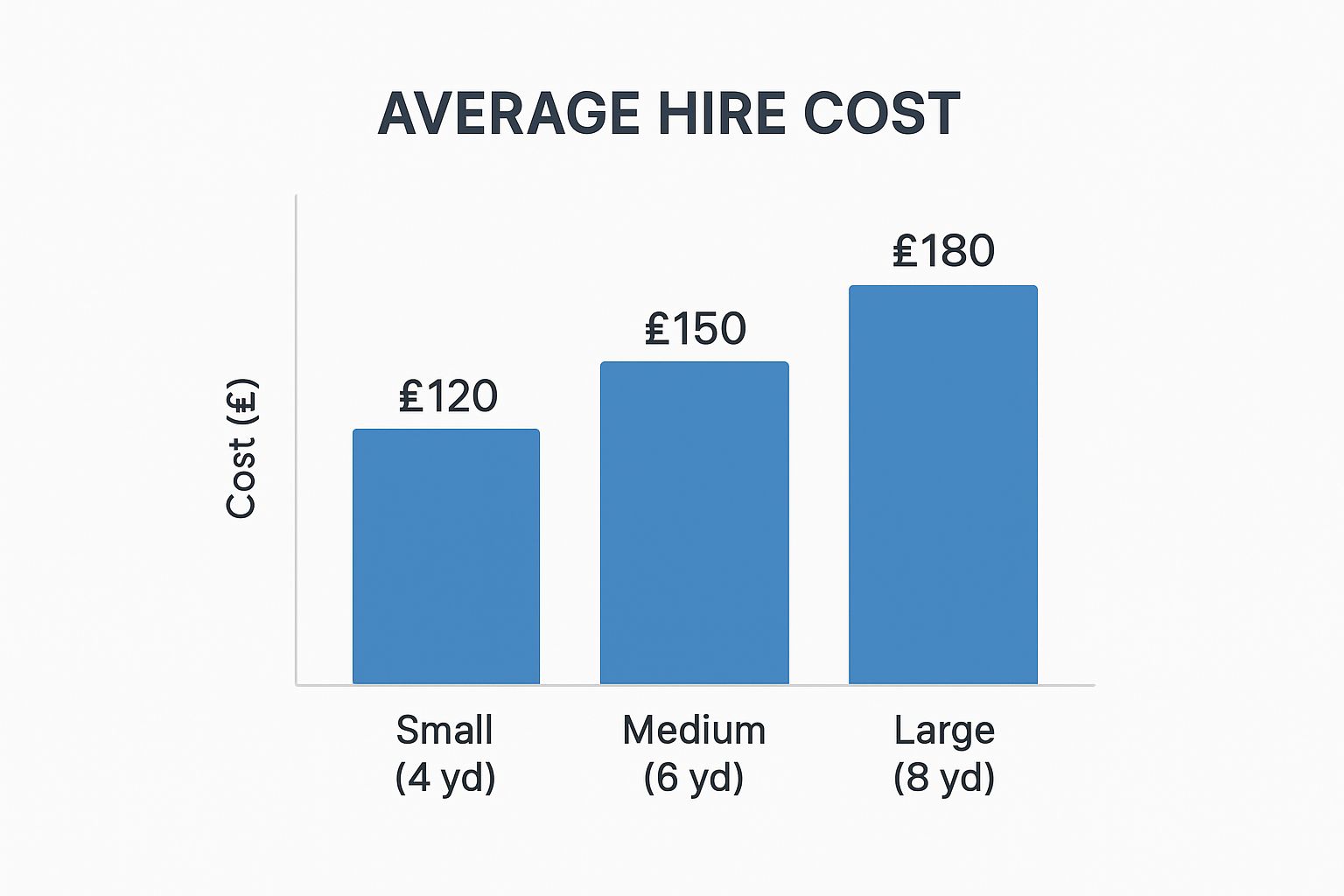
As you can see, the operational and disposal costs really start to climb as the skip size increases.
Landfill Tax and Supply Chain Pressures
But perhaps the most significant external factor is the UK Landfill Tax. This is a government charge on every tonne of waste that ends up in a landfill, brought in to encourage more recycling. While it’s great for the environment, it creates a substantial and ever-rising cost for skip companies. This tax tends to go up every year, pushing up the price of getting rid of non-recyclable waste.
Recent years have also thrown major supply chain challenges into the mix. Supply chain volatility now accounts for roughly 34% of the fluctuations in skip hire pricing, which has nearly doubled its impact in just a few years.
To give you a sense of the scale, the UK government’s landfill tax shot up from £91.35 per tonne in 2019 to an expected £126.15 per tonne by April 2025. That’s an increase of nearly 38%. You can learn more about how supply chain instability affects UK skip hire prices and see the data for yourself.
All of these pressures mean that the cost of hiring a skip is always tied to the health of the wider economy. By understanding these behind-the-scenes factors, you get a much better appreciation for the value you’re getting and can make a more informed choice for your project.
External Factors Influencing Your Skip Hire Bill
It’s easy to think the price is just for the skip itself, but a number of external costs play a big part in the final figure you’re quoted. The table below breaks down some of these key influences and how they typically affect the price.
| Cost Factor | Average Impact on Final Price (%) | Description |
|---|---|---|
| Landfill Tax | 25-40% | A government tax per tonne of waste sent to landfill. This is the largest external cost and rises annually. |
| Fuel Costs | 10-18% | Covers the diesel for delivery, collection, and transport of waste to recycling or disposal facilities. Highly volatile. |
| Steel Prices | 5-10% | Affects the cost of manufacturing new skips and repairing the existing fleet, a crucial long-term operational expense. |
| Labour Costs | 15-25% | Includes wages for drivers, yard staff, and administrative teams who manage your booking and waste processing. |
| Recycling Costs | 8-15% | The expense of sorting and processing recyclable materials. While cheaper than landfill, it still requires significant investment. |
As you can see, a large portion of what you pay goes towards covering these essential, and often fluctuating, operational and regulatory costs. Understanding this breakdown helps paint a clearer picture of where your money goes.
Why New Waste Rules Are Changing the Game
If you’ve hired a skip in the past, you might notice that things are a bit different now. The costs, the questions you’re asked, the rules about what can go in – it’s all changing, and for good reason. Environmental regulations are completely reshaping the waste industry, and that has a direct knock-on effect on the cost of skip hire near me.
The old days of just collecting a skip full of rubbish and tipping it in a landfill are long gone. We’re moving towards a much smarter system that’s all about responsible disposal and recycling.
Think about your bins at home. A decade or two ago, everything probably went into one black bag. Now, you’ve got separate bins for recycling, garden clippings, and general rubbish. That exact same shift is happening right now in the skip hire world, just on a much bigger scale.
This push for sustainability makes everything more complex on our end. It means more people are needed to sort materials by hand at waste transfer stations, we need specialised machinery to process different items, and our lorries make more trips to get specific types of waste to the right recycling facilities. Every single one of these steps adds to the running costs, which naturally filters down to the final price you pay.
The Big Push for Waste Segregation
One of the biggest changes is the legal requirement to keep certain types of waste separate from each other. You can’t just chuck everything in a skip together anymore, especially common building materials that can cause real problems if they aren’t handled properly.
Plasterboard is the classic example. When it gets wet and mixes with other general waste, it can start to break down and release hydrogen sulphide gas – which is nasty, smelly, and harmful. Because of this, the rules now demand that plasterboard is always kept separate, either in its own dedicated skip or in special bags. This need for waste segregation is a key reason we have to ask you exactly what you plan on putting in the skip.
This isn’t just about being a bit more green; it’s the law. Skip hire companies like us face hefty fines for getting it wrong, so we have to be incredibly careful. That extra diligence, while crucial for safety and the environment, adds another layer of operational cost to the service.
And the rules are only getting stricter. Upcoming regulations are creating some serious challenges for operators. An audit of 45 waste businesses in the West Midlands revealed that only a shocking 12% were ready for the new five-stream segregation rules. These changes have already caused the average number of vehicle movements for collections to jump by around 180% – a massive hike in fuel and labour costs. You can learn more about the challenges presented by the 2025 waste regulations and how they’re impacting the industry.
How Does This Affect Your Final Bill?
So, what does all this mean for your wallet when you search for “cost of skip hire near me”?
- Higher Base Prices: The investment in new sorting tech, extra staff, and more complex logistics simply increases the baseline cost of providing the service.
- Stricter Rules for You: You’ll need to be more mindful of what you’re putting into a mixed waste skip. If prohibited items are found mixed in, it can unfortunately lead to extra charges.
- Specialised Skips: For materials like plasterboard, you’ll likely need to hire a separate, dedicated skip, which is an additional cost to factor into your budget.
Ultimately, these environmental rules are a massive step in the right direction for a more sustainable future. But they do bring new processes and costs that are now an unavoidable part of modern, responsible waste management.
Finding the Best Value Skip Hire Service

A quick search for “cost of skip hire near me” will throw up a long list of prices, but it’s crucial to remember that the cheapest option is rarely the best. True value isn’t just about the lowest number; it’s about finding a reliable, professional, and fully compliant service that won’t spring nasty surprises on you later.
Getting smart about your choice is the key. It’s not just about the price tag—it’s about the peace of mind that comes from knowing your waste is being handled legally and responsibly. A few simple checks are all it takes to separate the real experts from the cowboys.
Get Multiple Quotes to Set a Benchmark
First things first: always try to get at least three quotes from different local companies. This does more than just hunt for the lowest price. It gives you a solid benchmark for the going rate in your area for the size of skip you need.
Be wary of any quote that seems suspiciously low. A rock-bottom price can be a huge red flag, often hinting that corners are being cut somewhere—whether that’s through illegal fly-tipping, terrible customer service, or a bill padded with hidden fees at the end. Use the average price as your guide. You can find a complete rundown of what goes into the final cost in our guide on how much it is to hire a skip.
Look Deeper Than the Price
Once you’ve got your quotes, it’s time to do a little digging. Never underestimate the power of online reviews on sites like Google or Trustpilot. Look for patterns in what other customers are saying.
- Punctuality: Were skips delivered and collected when they said they would be?
- Communication: Was the company easy to reach and helpful with queries?
- Condition of Skips: Were the skips delivered in good, safe condition?
- Billing Transparency: Did anyone mention unexpected charges appearing on their final bill?
This kind of real-world feedback is invaluable for getting a true sense of a company’s reliability.
Check for Essential Credentials
This part is absolutely non-negotiable. Any company that legally transports waste in the UK must hold a valid Waste Carrier Licence, which is issued by the Environment Agency. You can, and should, ask for their licence number and check it online for yourself.
Choosing an unlicensed operator is a massive risk. If your waste ends up fly-tipped, you could be the one held responsible and face hefty fines, even though you paid someone to take it away. A reputable company will have no problem proving their credentials.
It’s also worth asking about their recycling policies. A professional outfit will have a clear process for sorting waste and will be committed to recycling as much as possible, sending minimal amounts to landfill. This isn’t just good for the planet; it’s a strong sign you’re dealing with a responsible, forward-thinking operator.
Answering Your Top Skip Hire Questions
Searching for “cost of skip hire near me” can feel like opening a can of worms, often throwing up more questions than answers. To help you feel confident before you book, we’ve put together some clear, straightforward answers to the questions we hear the most.
How Can I Save Money on My Skip Hire?
Beyond shopping around for quotes, the single best way to get more bang for your buck is to load your skip efficiently. Think of it like packing a suitcase for a long holiday – a bit of strategy means you can fit far more in.
Start by laying flat items like old doors or fence panels along the bottom to create a solid base. Next, get to work breaking down any bulky items like wardrobes or tables; this dramatically reduces the amount of wasted, empty space. All those little gaps and corners? They’re perfect for tossing in smaller, loose debris. This method ensures you use every single cubic yard you’ve paid for, helping you avoid the frustrating cost of hiring a second skip.
What Items Are Banned from Skips?
While skips are fantastic for most types of rubbish, some items are strictly off-limits for very important safety and environmental reasons. These materials need specialised disposal and can’t just be chucked in with your general waste.
Some of the most common prohibited items include:
- Asbestos: A highly hazardous material that must be handled by licensed specialists.
- Refrigerators and Freezers: These contain harmful gases and need to be degassed properly.
- Tyres: Landfills won’t take them, so they must go to specialist recycling centres.
- Gas Cylinders: These pressurised containers pose a serious explosion risk.
- Batteries, Paint Tins, and Electricals (WEEE): Full of chemicals that can leak and pollute the soil and water.
If you’re ever unsure about a particular item, it’s always best to ask your skip hire provider. Getting it wrong isn’t just a simple mistake; disposing of prohibited materials correctly is a legal requirement.
Do I Need a Permit for My Skip?
Whether or not you need a permit all comes down to one simple thing: where the skip is going to live. The rule of thumb is, if the skip is on public land, you absolutely need a permit from your local council.
If your skip will sit entirely on your own private property, like your driveway or in the garden, you do not need a permit. But the moment any part of it touches a public pavement or road, a permit becomes mandatory.
Your skip hire company will almost always sort this out for you, but remember that the cost will be added to your final bill. Permit prices and how long they take to process can vary wildly from one council to another, so it’s always a good idea to plan ahead.
What Happens If I Overfill My Skip?
We get it. It’s so tempting to just squeeze that last little bit of rubbish on top, but overfilling a skip is a serious mistake that can cause a lot of hassle. For both safety and legal reasons, all skips have to be level-loaded. This just means the waste can’t pile up higher than the sides of the skip.
An overfilled skip is a genuine danger on the road. The driver has every right to refuse to collect it, or they might take the time to remove all the excess waste and leave it in a pile on your property. This not only causes delays but could also lead to extra charges for a wasted journey or the labour needed to make the load safe. If you’re on the fence, it’s always smarter to go for a slightly larger skip to avoid these costly and frustrating problems.
For a hassle-free, fully compliant waste management solution in Dorset, look no further than The Waste Group. We offer a price-match guarantee, next-day delivery, and a real commitment to responsible recycling. Get your instant online quote today and let us handle the rest.
Find the Cheapest Skip Hire Near Me – Best Deals Inside!
When you’re searching for the cheapest skip hire near me, it’s easy to focus on that initial quote. But that’s just one piece of the puzzle. The true cost of hiring a skip is often shaped by less obvious things like landfill taxes, fuel surcharges, and maybe even permit fees. These can all bump up the final bill, so understanding them from the get-go is the key to finding a genuinely good deal.
Decoding the True Cost of Skip Hire
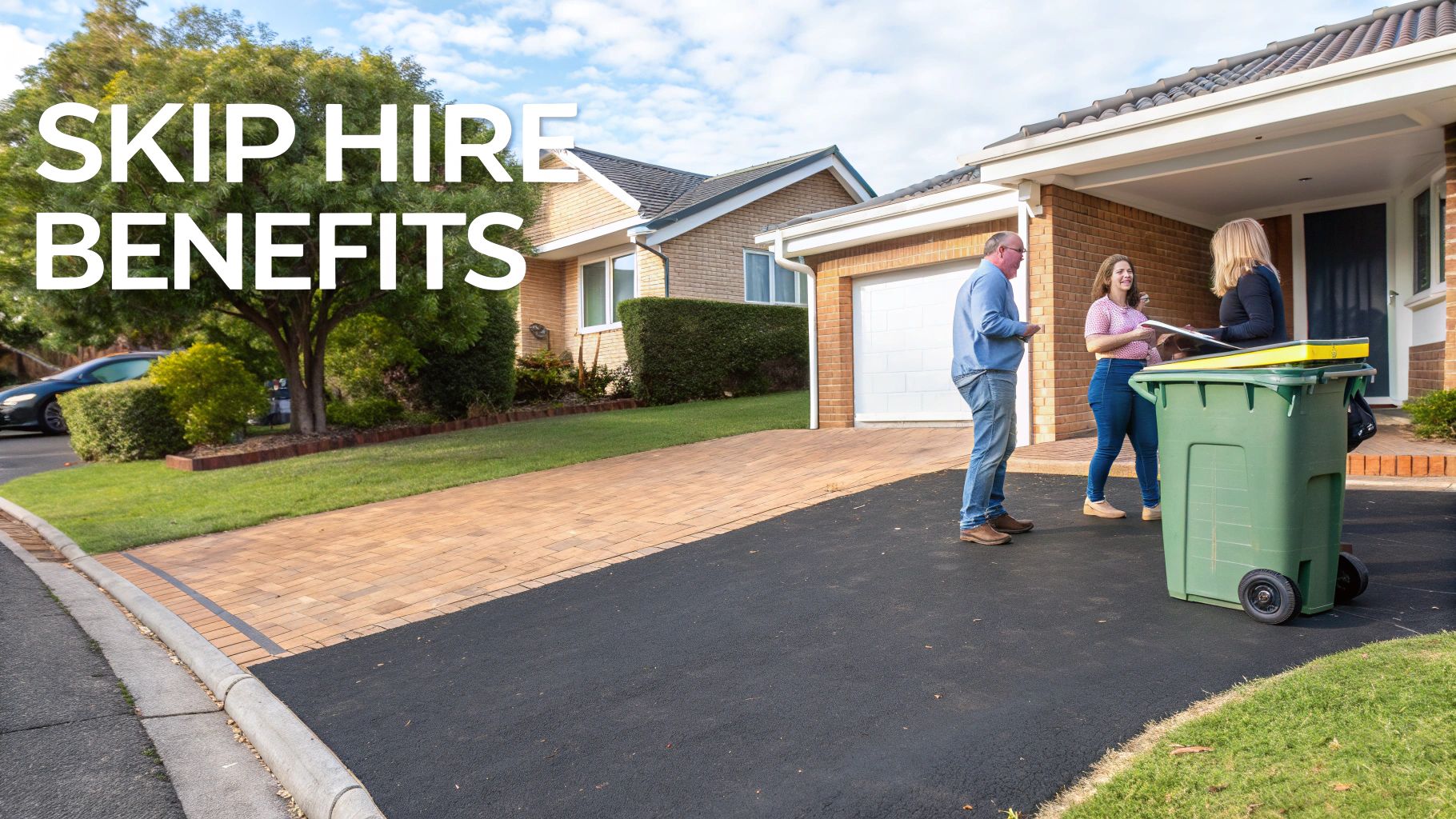
Finding a genuinely cheap skip means you have to look beyond that headline price. The figure you’re quoted is actually a pretty complex calculation, influenced by all sorts of operational and economic factors. You’re not just paying for a big metal box; you’re paying for a full service that includes delivery, collection, sorting the waste, and disposing of it responsibly.
It often surprises people just how much outside market forces can affect their local skip hire bill. Between 2022 and 2025, for instance, the cost of raw materials needed to make skips—especially steel—shot up by 31%. That sort of supply chain instability accounts for around 34% of the total price fluctuations we see in skip hire. Then there’s fuel; swings in diesel prices can make collection charges vary by 12-23% from one quarter to the next.
Key Factors That Drive Skip Prices
To compare quotes like for like, you need to know what makes up the total price. These are the often-unseen costs where the real value is determined.
- Landfill Taxes: This is a government tax on any waste that ends up in a landfill, and it goes up every year. Reputable companies will always factor this into their pricing. If you see a quote that seems unusually cheap, it might be a red flag that they’re cutting corners and disposing of waste improperly to dodge this tax.
- Permit Fees: If your skip has to go on public land, like the road outside your house, you’ll need a permit from the council. The cost varies depending on your local authority, but the skip company can usually sort this out for you for an extra fee.
- Waste Type: What you’re throwing away really matters. Heavy waste like soil and hardcore is more expensive to transport and process than lighter mixed waste. Certain items, like plasterboard, also come with extra charges because they need to be handled separately.
A price that seems too good to be true usually is. It could be a sign of a company scrimping on essential things like insurance, licensing, or their environmental responsibilities, which could leave you liable if something goes wrong.
Budgeting for Waste Disposal in Larger Projects
This detailed cost structure isn’t unique to skip hire. When you’re trying to figure out the cost of any big home improvement project, like building a new garden wall, remember that waste disposal is a major line item. Getting your head around the true cost of a retaining wall project means factoring in everything from materials and labour right down to the final site clearance.
By looking at skip hire as a complete service rather than just a product, you’ll be in a much better position to assess quotes. This knowledge lets you ask the right questions and find a company that offers genuine, compliant value, making sure your project runs smoothly without any nasty financial surprises.
Finding Genuine Bargains on Local Skip Hire

Now that you have a solid grasp of what goes into skip hire pricing, you can start your search for the best deal with a bit more confidence. The aim isn’t just to find the cheapest price, but to find a price that reflects genuine value. That means looking beyond a quick online search and using a few smart tactics to find the best local companies.
Your first thought might be to use an online comparison site. These can be handy for a quick overview of who’s out there, but they rarely paint the full picture. Many are simply lead generators that pass your details along, sometimes adding their own commission on top of the price you pay.
A much better approach is to use these sites for a spot of initial research, and then go directly to the source.
Go Direct to Local Companies
Once you’ve got a shortlist of local providers, pick up the phone. You’ll often find that speaking directly to independent, local companies unlocks better prices and more flexible service. They simply don’t have the same overheads as the big national chains and have a local reputation to protect. This direct conversation is your best chance at getting a truly transparent quote.
When you call, make sure you’re armed with the right questions to avoid any nasty surprises later on.
- Is VAT included in the price you’ve quoted me?
- What’s the standard hire period, and what are the extra charges if I need it for longer?
- Does your quote include delivery, collection, and all the disposal fees?
- If I need a permit, will you sort that out, and is the cost included?
Getting straight answers to these questions helps you build a true picture of the final cost. You can learn more about how different factors influence the final bill by exploring detailed guides on current skip hire prices near you.
The cheapest quote is no bargain at all if the skip turns up late or, even worse, doesn’t turn up at all. A company’s reliability is every bit as important as its price. A dependable service saves you from costly project delays and the headache of chasing up a collection.
Judging Reliability Beyond the Price Tag
A low price is meaningless without good service to back it up. Before you commit, spend a few minutes checking out the company’s reputation online. Look for recent reviews on platforms like Google or Trustpilot. Don’t just glance at the star rating; dive into what customers are actually saying.
Keep an eye out for patterns in the feedback. Are customers consistently praising the company for things like:
- Punctual delivery and collection? This is absolutely vital for keeping your project on track.
- Clear communication? Were customers kept in the loop about timings?
- Helpful drivers? Was the driver considerate when placing the skip on their property?
A couple of negative reviews are normal for any business, but a consistent theme of late deliveries, hidden charges, or poor communication is a massive red flag. By combining direct quotes with a bit of solid research into a company’s reliability, you put yourself in the best possible position to find a genuinely great deal.
Choosing the Right Skip Size to Avoid Wasted Money
One of the quickest ways to overspend on waste removal is picking the wrong skip size. It’s a classic mistake. If you order one that’s too big, you’re literally paying for fresh air. On the other hand, underestimating your rubbish could mean you’re faced with the surprise expense and headache of hiring a second skip just to finish the job.
Getting this right is crucial for anyone searching for the “cheapest skip hire near me,” because the best price is meaningless if it’s for the wrong product. Think of it like a removal van; you wouldn’t hire a massive lorry to move the contents of a studio flat. The same logic applies here. You need to match the container to the job at hand.
Visualising Your Waste Volume
The trickiest part for most people is picturing how much rubbish they actually have. Skip sizes are measured in cubic yards, which isn’t a unit many of us use day-to-day. A simple way to get a good estimate is to think in terms of standard black bin bags.
For example, a small domestic project like clearing out a garden shed or a single room might only generate 20-30 bin bags of waste. In this scenario, a 2-yard ‘mini skip’ is perfect. But a full kitchen renovation, complete with old units, tiles, and flooring, could easily fill an 8-yard ‘builders skip’, which holds around 70-80 bin bags.
The goal is to hire a skip that you can fill comfortably without being tempted to overfill it. Overloading a skip past its marked ‘level load’ line is illegal for drivers to transport, which can lead to wasted journey fees and the unpleasant task of having to unload the excess yourself.
This chart shows just how much the cost can jump between sizes, highlighting why an accurate choice is so important for your budget.
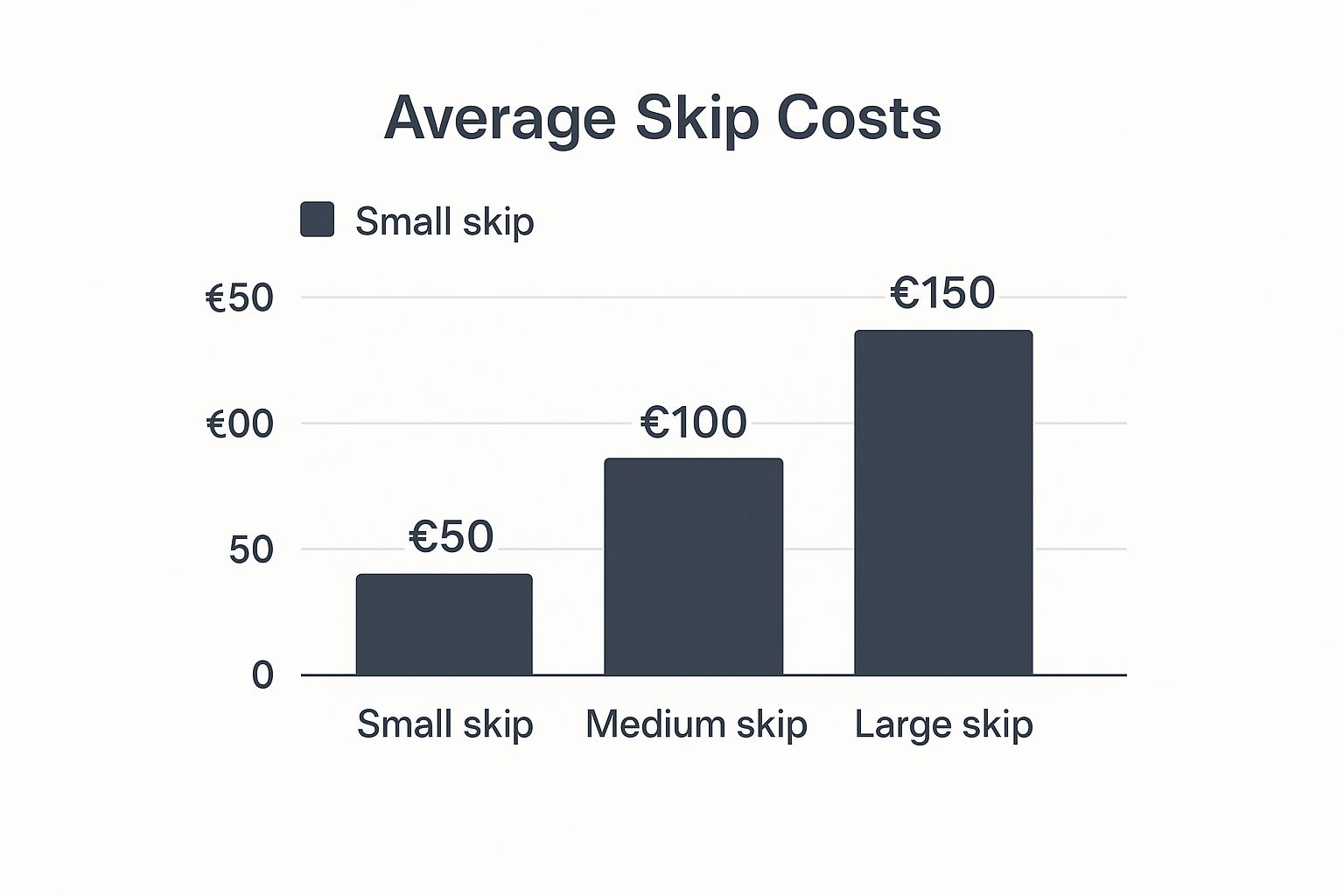
As you can see, jumping up a size category can significantly increase your costs, reinforcing the need to estimate your waste volume as accurately as possible before you book.
A Quick Guide to Common Skip Sizes
Matching your project to the right skip is straightforward once you know what you’re looking for. To make things a bit clearer, I’ve put together a simple table outlining the most common sizes and what they’re typically used for.
Common UK Skip Sizes and Typical Uses
| Skip Size (Cubic Yards) | Approx. Bin Bags | Ideal For |
|---|---|---|
| 2-4 Yard (Mini/Midi) | 20 – 40 | Small garden clearances, single room declutters, minor DIY jobs. |
| 6-8 Yard (Builder’s) | 60 – 80 | Kitchen/bathroom refits, major renovations, general construction & household waste. |
| 10-12 Yard (Maxi) | 100 – 120 | Large house clearances, bulky but light items like furniture and shop fittings. |
This quick-glance table should help you narrow down your options, but here are a few more pointers:
- 2-4 Yard Skips (Mini/Midi): These are the go-to for small-scale garden clearances, minor DIY jobs, or decluttering a single room. Their compact size makes them perfect for properties with limited access, like a small driveway.
- 6-8 Yard Skips (Builders Skips): This is the most popular choice for general construction waste and larger home renovations, such as a bathroom or kitchen refit. Most companies allow heavy waste like soil and rubble in an 8-yard skip.
- 10-12 Yard Skips (Maxi Skips): Suited for bulky but lightweight items from large house clearances or shop fit-outs. Take note that these larger skips often cannot be used for heavy waste like soil due to weight restrictions on the lorries.
For a more detailed breakdown of dimensions and capacities, you can find in-depth information by reviewing this helpful guide on how skip sizes are explained. Taking five minutes to understand these options ensures you make an informed decision and don’t waste a penny.
How Green Regulations Affect Your Search for a Cheap Skip

The world of waste management has changed massively in recent years, and it’s had a real knock-on effect on what you pay. When you’re searching for the cheapest skip hire near me, it’s easy to think the price is just for the big metal box itself. The reality is, a huge chunk of that cost is now driven by strict environmental rules that every responsible company has to follow.
These aren’t just bits of bureaucratic red tape; they’re fundamental to how modern waste is handled. They directly pump up a company’s running costs, and that, in turn, shapes the quotes you receive.
The Ever-Increasing Cost of Landfill
One of the biggest financial headaches for the industry comes straight from government taxes. The UK skip hire sector is currently grappling with some major cost hikes, and a lot of it boils down to these green regulations.
The main culprit? Landfill tax. As of April 2025, this tax has rocketed to £126.15 per tonne. To put that in perspective, it was just £91.35 per tonne back in 2019. That’s a serious jump.
This tax is there to stop us from just burying all our rubbish, but for skip companies, it’s a massive, unavoidable operating cost. You can read more about how these waste regulations are creating struggles for skip hire firms. This financial squeeze is exactly why a quote that seems too good to be true probably is.
An extremely cheap quote should set alarm bells ringing. It often means the company is cutting corners and dodging legal disposal routes to avoid those hefty landfill taxes. This could even involve illegal fly-tipping. If that waste is traced back to you, you’re the one who could be facing a massive fine.
The New Rules for Sorting Your Waste
It isn’t just taxes making things more complex. New regulations now insist that waste is carefully separated into at least five different streams before it can be processed.
This means pulling apart materials like:
- Organic matter
- General recyclables (paper, card, plastic)
- Hazardous materials
- Textiles
- Residual, non-recyclable waste
For a skip hire company, this means shelling out for proper sorting facilities, specialised machinery, and trained staff to manually sift through the contents of every single skip. It’s a labour-intensive job that’s crucial for staying compliant, but it adds another layer of cost to the service. A company that invests in doing this right is protecting both the planet and its customers.
Choosing a provider that follows these green rules isn’t just about being eco-conscious; it’s about protecting yourself. Reputable firms factor these compliance costs into their pricing. It might mean the upfront cost is a little higher, but it gives you peace of mind that your waste is being handled legally and responsibly. That’s the real meaning of value in today’s market.
Smart Ways to Reduce Your Final Skip Hire Bill

Getting a great initial price is a fantastic start, but the real savings often come from how you manage the skip once it’s on your property. It’s the small, smart actions that can make a surprisingly big difference to your final bill, ensuring you get maximum value and avoid any unexpected penalties.
The most effective strategy is to think like a waste management professional. This really just means sorting your rubbish before it even goes into the skip. By separating different types of waste, you can often unlock better rates from the hire company.
The Power of Pre-Sorting Your Waste
Most people just throw everything into the skip together, but this mixed waste is far more labour-intensive for the company to process down the line. If you can present them with a skip containing just one type of material, their costs go down—and a good company will sometimes pass those savings on to you.
Before you start loading, think about creating separate piles for specific waste streams:
- Clean Hardcore: This is your bricks, concrete, and rubble.
- Soil and Stone: Often accepted as a single waste type.
- Green Waste: Garden clippings, branches, and other organic matter.
- Wood: Any untreated timber or old wooden furniture.
When waste is segregated, companies can recycle up to 70% of collected materials. This dramatically reduces what they send to landfill and helps them mitigate the hefty £126.15 per tonne landfill tax.
Skips containing only soil or green waste may even qualify for a discounted rate. It’s a simple tactic that directly cuts your costs. To get a better feel for how these factors influence the numbers, have a look at our breakdown of local skip hire prices.
Load Your Skip Like a Pro to Maximise Space
How you fill the skip is just as important as what you put in it. A poorly loaded skip is just wasted space you’ve paid for, and it seriously increases the risk of overfilling—which always comes with hefty penalties.
Start by placing large, flat items like old doors or panels along the bottom and sides to create a level base. Then, break down anything bulky. Smash up that old furniture and flatten any boxes to get rid of empty air pockets. As you go, fill the gaps with smaller debris, making sure you use every last inch of space efficiently.
Pro Tip: Never, ever fill your skip above the marked ‘level load’ line. Drivers are legally prohibited from transporting overloaded skips. You’ll likely face a ‘wasted journey’ fee and be forced to remove all the excess waste yourself. This one mistake can instantly wipe out any savings you made on the initial quote.
Ultimately, keeping project costs down involves more than just waste. To keep your entire project on track, it’s worth exploring broader smart strategies for reducing construction costs for valuable insights. These simple, practical steps put you in control, turning a standard hire into the cheapest skip hire possible.
Common Questions About Affordable Skip Hire
Hiring a skip, especially if it’s your first time, can feel a bit daunting. You’re trying to track down the best price, but you’re also suddenly dealing with permits, weight limits, and waste rules. To help you feel more confident, we’ve put together clear, straightforward answers to the most common questions people have when looking for affordable skip hire.
Getting these details right from the start is the key to making sure your project runs smoothly and your budget stays intact. A simple misunderstanding about what’s allowed in a skip or where you can put it can quickly lead to unexpected costs and frustrating delays.
Do I Really Need a Permit for My Skip?
This is one of the most frequent questions we get, and thankfully, the answer is simple: it all depends on where the skip is going to live. If you can fit the skip entirely on your private property—like a driveway or garden—then no permit is needed. This is by far the easiest and cheapest route.
However, if any part of the skip needs to sit on public land, like a road, pavement, or grass verge, you absolutely must have a permit from your local council. Your skip hire company should sort this out for you, but it’s always wise to double-check. Permit costs vary between councils but typically fall in the £30-£60 range. Make sure this is included in your quote to avoid a nasty surprise on the final bill.
What Happens If I Overfill the Skip?
It’s always tempting to squeeze in that last little bit of rubbish, but trust us, overfilling a skip is a serious mistake. Every skip has a ‘level load’ line clearly marked on its side. Filling it beyond this point isn’t just against the company’s policy—it’s illegal for the driver to transport it.
An overloaded skip is a genuine safety hazard on the road. The collection driver will refuse to take it until you’ve removed all the excess waste. This can be a real headache, and many companies will charge a ‘wasted journey fee’ for their time and fuel. This single error could easily wipe out any savings you made finding the cheapest skip hire in the first place.
A level load isn’t just a suggestion; it’s a legal requirement. Drivers face hefty fines and points on their licence for transporting unsafe loads, so they simply won’t take the risk. Always load responsibly to ensure a smooth, penalty-free collection.
What Can I Absolutely Not Put in a Skip?
Understanding what’s prohibited is crucial for avoiding fines and hassle. Thanks to strict environmental and safety regulations, certain hazardous materials are banned from general waste skips. These items need specialist disposal and can cause serious contamination if they get mixed in with everything else.
While each provider may have a slightly different list, the following items are almost universally forbidden:
- Asbestos: This is highly dangerous and requires specialist removal services.
- Plasterboard: Cannot be mixed with other waste due to its chemical composition.
- Electricals: Items like fridges, TVs, and monitors (known as WEEE waste).
- Tyres and Batteries: These contain harmful chemicals that can leak.
- Liquids: This includes paint, oil, and solvents.
- Gas Canisters: These pose a serious explosion risk.
Always ask your chosen company for their specific list of prohibited items before you start filling the skip. Getting it wrong can lead to your skip being returned at your expense or significant extra charges for its safe disposal.
For hassle-free, compliant, and affordable waste management solutions in Dorset, trust the experts at The Waste Group. Find the perfect skip for your project and book online today!
